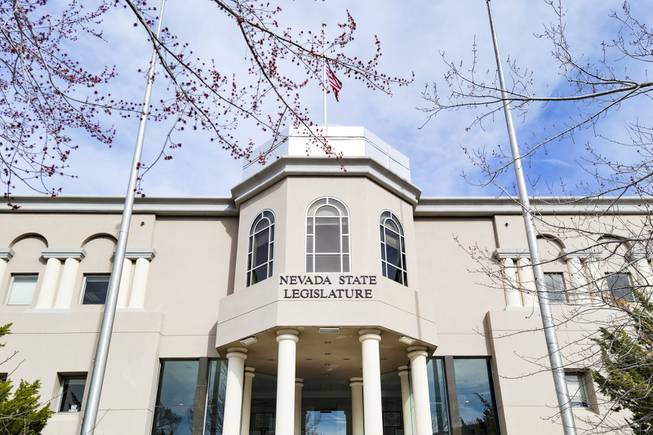
The Nevada State Legislature building in Carson City, NV Friday, April 2, 2021.
Published Monday, Feb. 6, 2023 | 8:28 a.m.
Updated Monday, Feb. 6, 2023 | 1:11 p.m.
CARSON CITY — The Nevada Legislature opened Monday with a prayer, a rendition of the state anthem and swearings-in ahead of four months of negotiations, hearings and votes that will define the state’s budget and operations for the next two years.
A joint session of the Assembly and Senate convened for songs and ceremonies including state Supreme Court Chief Justice Lidia Stiglich administering oaths of office to lawmakers.
The Democratic-controlled Legislature is expected to spar with newly elected Republican Gov. Joe Lombardo amid efforts to find common ground on a wide range of proposals, most notably provisions in the governor's two-year, $11 billion budget that anticipates starting with a historic surplus.
Nevada is one of only 10 states in which the same party does not control both the governor's mansion and the two legislative chambers, the lowest number since 1952, according to the National Conference of State Legislatures.
In his State of the State address two weeks ago, Lombardo announced his goals of suspending the state gasoline tax for a year, making unprecedented investments in education and using the budget surplus to prioritize fiscal savings.
The former elected head of the Las Vegas Metropolitan Police Department also proposed stiffening criminal penalties, creating a new state office to expand school choice and raising state employee pay 12% over the next two years. He insisted all the initiatives can be accomplished without new taxes.
The $11.4 billion two-year budget is nearly $2.3 billion more than the expiring budget set in 2021, a product of projected increases in state tax revenue, fueled by strong sales and gaming tax revenue that benefited from high inflation and strong consumer spending.
That financial cushion has helped spur Lombardo's unprecedented $2 billion K-12 budget request that includes wide-scale investments in public education, along with proposals to increase school choice, which generally refers to using taxpayer-funded programs to help parents pay for other educational options including private or charter schools, home-schooling or hybrid models.
Lombardo has to balance school choice initiatives and public school financing in the Democratic-controlled Legislature.
“I got to be pragmatic about it,” he acknowledged at a recent Q&A forum.
Nevada’s part-time elected lawmakers — 21 in the Senate and 42 in the Assembly — convene every two years for a 120-day session. Democrats hold a majority in the state Senate and supermajority in the state Assembly.
Also featured will be questions about how to diversify Nevada’s largely tourism and casino-based economy, a shrinking Western regional water supply, federal land battles and filling the state's nearly one in four vacant public jobs.
Abortion policies may also take center stage, even in a state where the right to an abortion is codified into law through 24 weeks because of a 1990 referendum vote.
Lombardo had waffled during his campaign on whether he would uphold an executive order that would protect out-of-state patients and in-state providers from prosecution and penalties. He first said he would repeal it, before backtracking and saying he would leave it as is. Democratic Senate Majority Leader Nicole Cannizzaro said she would introduce a bill that would codify the order into state law.
The governor has also said he wants to substantially revise or repeal a law passed by the Democratic-controlled Legislature in 2021 that would create a state-run public health insurance option by 2026, making Nevada the second state in the country to pass a law of its kind, behind Washington. He said the implementation was rushed and called it “political theater.”
___
Stern is a corps member for the Associated Press/Report for America Statehouse News Initiative. Report for America is a nonprofit national service program that places journalists in local newsrooms.
